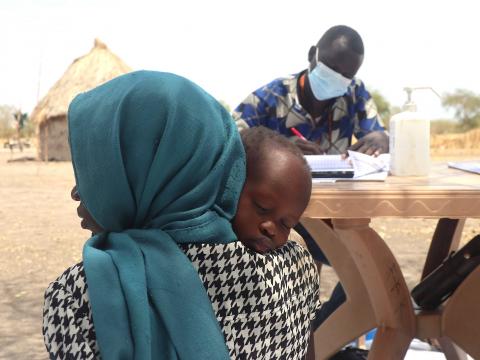World Vision’s mobile clinic targets 50,000 people in South Sudan’s Upper Nile State

The communities in Upper Nile State’s Fashoda and Manyo Counties have been classified as in a state of emergency with 16% of the population facing food insecurity, worsening the already high malnutrition rate among children.
The Acheik Primary Health Care Clinic (PHCC) in Lul Payam of Fashoda County is one of the 7 non-functioning health facilities out of the 16 in Fashoda County under thein the County Ministry of Health (MoH) since 2011.
To address the people’s health needs, World Vision’s Restoring Lives of Families in Emergency in South Sudan (R-LIFE II) Project funded by the Bureau of Humanitarian Assistance of the US Agency for International Development (USAID). The project conducts weekly mobile clinic services.

“The nearest facility which is Oriny PHCC takes three hours of walking”, says the mother of one, Khemisa Joseph 19. In many parts of South Sudan, people endure extreme heat in the dry season and flooding during rainy seasons when most of the roads are inaccessible.
These weather conditions make things very difficult for mothers like Khemisa, the elderly, and children to go to the clinic at a distance of over 40 kilometers.

“Our health clinic got destroyed by both the conflict and then the floods. The condition here gets even worse during the rainy season as it becomes impossible for us to go anywhere. We can brace walking in the heat. We have no other choice”, adds Khemisa.
The people in this community suffered long enough for the lack of health facilities. Women lose their babies during birth, and people die, due to minor diseases, which is unacceptable.
R-LIFE II Project Manager Isaiah Sei adds, “Through the project duration, the mobile health clinic aims at providing lifesaving, primary healthcare response to children in hard-to-reach areas for 34,004 internally-displaced persons, 21,500 people in host communities, and the rest of the population in Manyo and Fashoda counties.
Khemisa shares, “This is the second time my child is receiving treatment from the mobile clinic. Having the clinic come to the community is a lifesaver as babies no longer go through the distance under the sun.”

World Vision’s registered nurse Tabu Godfrey Charles shares, “We provide treatment to about 100 people in a day and an estimated 500 per week.” What are the common causes being treated?
Nygit Othor 24-year-old mother of two says, “The people in this community suffered long enough for the lack of health facilities. Women lose their babies during birth, and people die, due to minor diseases, which is unacceptable.”
“As a mother, I appeal to World Vision, the government, and other agencies to restore the facility so we can focus on feeding our families”, Nygit adds.

World Vision’s mobile clinic covers nine sites in Galbany, Abruoc, Acheik, Adod, Akorwai, Dela Ajak, Ayat, Ketgwang, and Abenyayo in Fashoda and Manyo Counties. From January to March 2021, an estimated 13,538 people have already availed of the expanded program for Immunization (EPI), treatment, and prevention of communicable diseases.
The mobile clinic outreach integrates COVID 19 virus risk communication geared towards the prevention of the spread of the virus among the target beneficiaries. COVID 19 virus presentation precautionary measures also followed by the health staff and the beneficiaries during the outreach.
Watch: Mothers in South Sudan continue to fight malnutrition
Story and photos by Scovia Faida Charles Duku, Communications Coordinator with inputs from Isaiah Sei, Project Manager